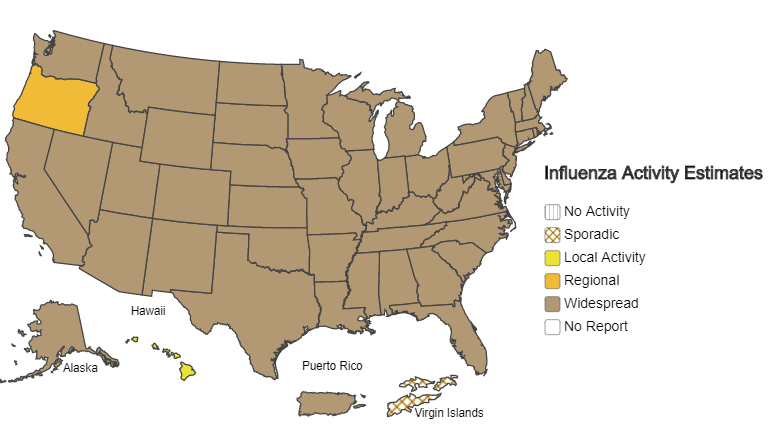Rapid Weather Swings Increase Flu Risk
Special Stories
6 Mar 2020 2:00 AM
[From Florida State University written by Kathleen Haughney] New research from a team of Florida State University scientists shows that rapid weather variability could increase the risk of a flu epidemic in some highly populated regions. The research was published recently in the journal Environmental Research Letters.
Zhaohua Wu, an associate professor in the Department of Earth, Ocean and Atmospheric Science and scientist with the Center for Ocean-Atmospheric Prediction Studies, and an international team looked at historical data to see how significant weather swings in the autumn months affect flu season in highly populated regions of northern-mid latitudes of the world. They specifically looked at the United States, mainland China, Italy and France.
Using surface air temperatures from Jan. 1, 1997 to Feb. 28, 2018, researchers analyzed weather patterns and average temperatures over 7,729 days. Simultaneously, they conducted statistical analysis on influenza data sets from the four countries over the same time period.
 [Latest flu map from the CDC]
Previous research suggested low temperatures and humidity in the winter create a favorable environment for transmitting the flu virus. However, the 2017-2018 flu season was one of warmest on record and yet also one of the deadliest. The Centers for Disease Control reported 186 children’s deaths during the 2017-2018 season. The previous high was 171 during the 2012-2013 season.
During the 2017-2018 flu season, scientists found that the extreme fluctuations in weather during the autumn months essentially kick-started the flu, building a patient population early in the season that snowballed in densely populated areas given the contagious nature of the virus.
“The historical flu data from different parts of the world showed that the spread of flu epidemic has been more closely tied to rapid weather variability, implying that the lapsed human immune system in winter caused by rapidly changing weather makes a person more susceptible to flu virus,” Wu said.
[Latest flu map from the CDC]
Previous research suggested low temperatures and humidity in the winter create a favorable environment for transmitting the flu virus. However, the 2017-2018 flu season was one of warmest on record and yet also one of the deadliest. The Centers for Disease Control reported 186 children’s deaths during the 2017-2018 season. The previous high was 171 during the 2012-2013 season.
During the 2017-2018 flu season, scientists found that the extreme fluctuations in weather during the autumn months essentially kick-started the flu, building a patient population early in the season that snowballed in densely populated areas given the contagious nature of the virus.
“The historical flu data from different parts of the world showed that the spread of flu epidemic has been more closely tied to rapid weather variability, implying that the lapsed human immune system in winter caused by rapidly changing weather makes a person more susceptible to flu virus,” Wu said.
 [Zhaohua Wu, associate professor of meteorology at FSU. Photo from FSU]
The issue going forward, scientists noted, is that rapid weather variability is common in warming climates. Having a better understanding of those weather patterns may be key to determining the severity of any future flu season threat.
“The autumn rapid weather variability and its characteristic change in a warming climate may serve not only as a skillful predictor for spread of flu in the following season but also a good estimator of future flu risk,” Wu said. “Including this factor in flu spread models may lead to significantly improved predictions of flu epidemic.”
Wu said he and his team are continuing to pursue this line of research with the ultimate goal of creating a model that incorporates both traditional flu indicators on the health and medicine side with environmental factors such as weather patterns.
[Zhaohua Wu, associate professor of meteorology at FSU. Photo from FSU]
The issue going forward, scientists noted, is that rapid weather variability is common in warming climates. Having a better understanding of those weather patterns may be key to determining the severity of any future flu season threat.
“The autumn rapid weather variability and its characteristic change in a warming climate may serve not only as a skillful predictor for spread of flu in the following season but also a good estimator of future flu risk,” Wu said. “Including this factor in flu spread models may lead to significantly improved predictions of flu epidemic.”
Wu said he and his team are continuing to pursue this line of research with the ultimate goal of creating a model that incorporates both traditional flu indicators on the health and medicine side with environmental factors such as weather patterns.
 [Latest flu map from the CDC]
Previous research suggested low temperatures and humidity in the winter create a favorable environment for transmitting the flu virus. However, the 2017-2018 flu season was one of warmest on record and yet also one of the deadliest. The Centers for Disease Control reported 186 children’s deaths during the 2017-2018 season. The previous high was 171 during the 2012-2013 season.
During the 2017-2018 flu season, scientists found that the extreme fluctuations in weather during the autumn months essentially kick-started the flu, building a patient population early in the season that snowballed in densely populated areas given the contagious nature of the virus.
“The historical flu data from different parts of the world showed that the spread of flu epidemic has been more closely tied to rapid weather variability, implying that the lapsed human immune system in winter caused by rapidly changing weather makes a person more susceptible to flu virus,” Wu said.
[Latest flu map from the CDC]
Previous research suggested low temperatures and humidity in the winter create a favorable environment for transmitting the flu virus. However, the 2017-2018 flu season was one of warmest on record and yet also one of the deadliest. The Centers for Disease Control reported 186 children’s deaths during the 2017-2018 season. The previous high was 171 during the 2012-2013 season.
During the 2017-2018 flu season, scientists found that the extreme fluctuations in weather during the autumn months essentially kick-started the flu, building a patient population early in the season that snowballed in densely populated areas given the contagious nature of the virus.
“The historical flu data from different parts of the world showed that the spread of flu epidemic has been more closely tied to rapid weather variability, implying that the lapsed human immune system in winter caused by rapidly changing weather makes a person more susceptible to flu virus,” Wu said.
 [Zhaohua Wu, associate professor of meteorology at FSU. Photo from FSU]
The issue going forward, scientists noted, is that rapid weather variability is common in warming climates. Having a better understanding of those weather patterns may be key to determining the severity of any future flu season threat.
“The autumn rapid weather variability and its characteristic change in a warming climate may serve not only as a skillful predictor for spread of flu in the following season but also a good estimator of future flu risk,” Wu said. “Including this factor in flu spread models may lead to significantly improved predictions of flu epidemic.”
Wu said he and his team are continuing to pursue this line of research with the ultimate goal of creating a model that incorporates both traditional flu indicators on the health and medicine side with environmental factors such as weather patterns.
[Zhaohua Wu, associate professor of meteorology at FSU. Photo from FSU]
The issue going forward, scientists noted, is that rapid weather variability is common in warming climates. Having a better understanding of those weather patterns may be key to determining the severity of any future flu season threat.
“The autumn rapid weather variability and its characteristic change in a warming climate may serve not only as a skillful predictor for spread of flu in the following season but also a good estimator of future flu risk,” Wu said. “Including this factor in flu spread models may lead to significantly improved predictions of flu epidemic.”
Wu said he and his team are continuing to pursue this line of research with the ultimate goal of creating a model that incorporates both traditional flu indicators on the health and medicine side with environmental factors such as weather patterns.All Weather News
More